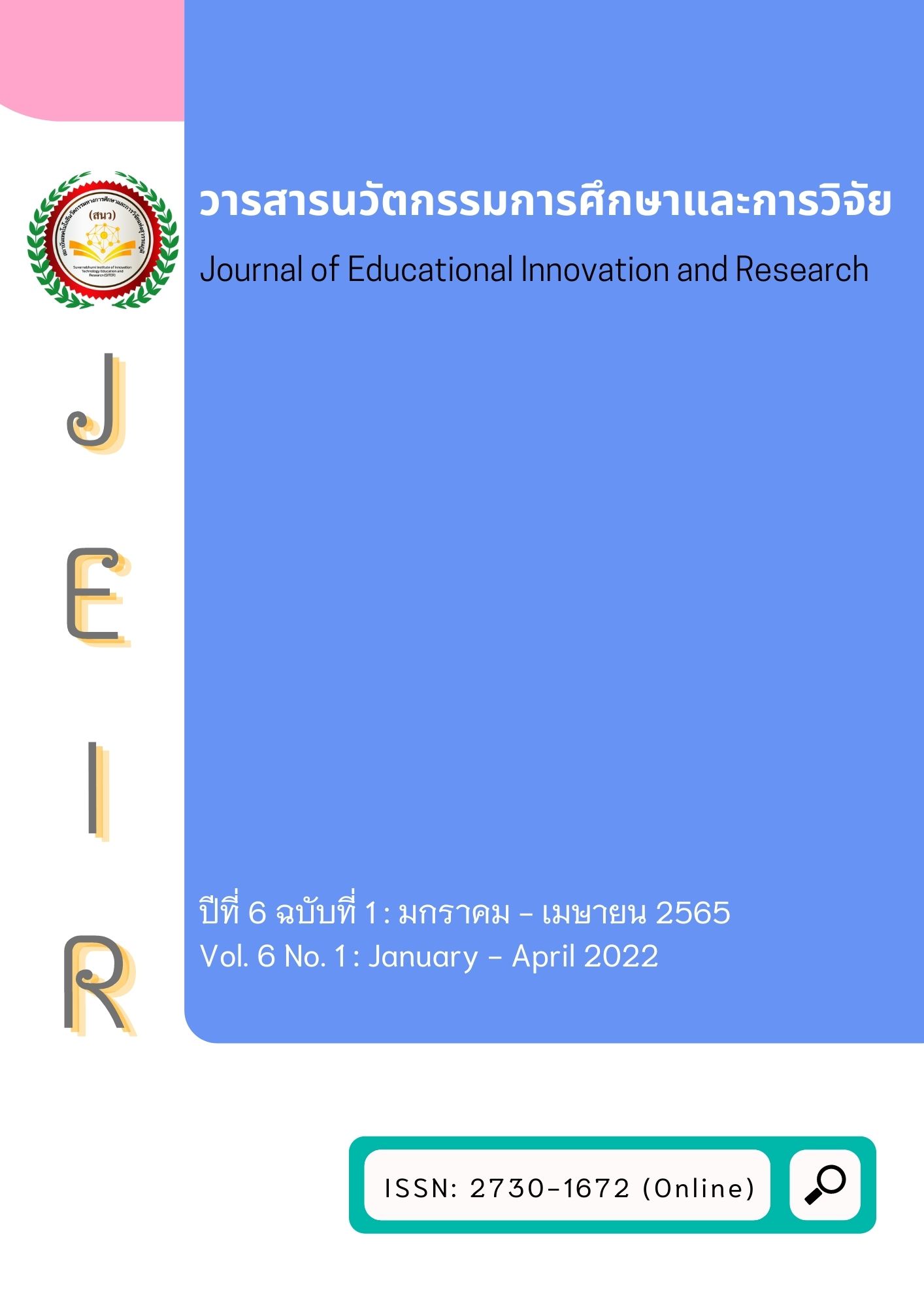ความสัมพันธ์เชิงสาเหตุของปัจจัยที่มีอิทธิพลต่อการดำเนินงานภายใต้หลักเศรษฐกิจหมุนเวียนของอุตสาหกรรมอาหารสำเร็จรูปในประเทศไทย
Main Article Content
บทคัดย่อ
อุตสาหกรรมอาหารของไทยเป็นตัวแปรสำคัญในการขับเคลื่อนเศรษฐกิจ ทั้งการมีส่วนร่วมเพื่อการรักษาคุณภาพสิ่งแวดล้อมควบคู่ไปกับการพัฒนาอุตสาหกรรมอาหารอย่างยั่งยืน โดยการบริหารจัดการห่วงโซ่อุปทานของการผลิตอาหารสำเร็จรูปเริ่มตั้งแต่การเตรียมวัตถุดิบจนถึงการแปรรูปอาหารด้วยกรรมวิธีต่างๆ ที่เป็นมิตรต่อสิ่งแวดล้อมภายใต้หลักเศรษฐกิจหมุนเวียน การวิจัยนี้มีวัตถุประสงค์เพื่อ 1) ศึกษาประสิทธิผลในการดำเนินงานภายใต้หลักเศรษฐกิจหมุนเวียนของอุตสาหกรรมอาหารสำเร็จรูปในประเทศไทยที่พัฒนาขึ้นกับข้อมูลเชิงประจักษ์ และ 2) ศึกษาอิทธิพลของปัจจัยที่มีต่อผลการดำเนินงานภายใต้หลักเศรษฐกิจหมุนเวียนของอุตสาหกรรมอาหารสำเร็จรูปในประเทศไทย โดยใช้ระเบียบวิจัยเชิงปริมาณโดยใช้แบบสอบถามเป็นเครื่องมือเก็บข้อมูลจากผู้ประกอบการนิติบุคคลผู้ผลิตที่ประกอบการอาหารสำเร็จรูปในประเทศไทยจำนวน 220 ชุด และวิเคราะห์ด้วยค่าสถิติเชิงพรรณนาและรวบรวมข้อมูลมาวิเคราะห์โดยใช้การวิเคราะห์ค่าทางสถิติและตัวแบบสมการโครงสร้าง
ผลการวิจัยพบว่า ปัจจัยผลการดำเนินงานภายใต้หลักเศรษฐกิจหมุนเวียนของอุตสาหกรรมอาหารสำเร็จรูปได้รับผลกระทบเชิงบวกมาจากปัจจัยโลจิสติกส์เพื่อสิ่งแวดล้อมพร้อมกับได้รับผลกระทบทางตรงเชิงบวกจากปัจจัยหลักปฏิบัติที่เป็นมิตรต่อสิ่งแวดล้อมอย่างมีนัยสำคัญทางสถิติ ซึ่งเป็นประโยชน์ต่อภาคธุรกิจในการกำหนดแนวทางการวางกลยุทธ์ปรับปรุงกระบวนการในระบบโซ่อุปทานที่เป็นมิตรต่อสิ่งแวดล้อมภายใต้หลักเศรษฐกิจหมุนเวียน เช่น ประสิทธิภาพกระบวนการโลจิสติกส์ ลดของเสียและมลพิษ ตลอดจนช่วยเสริมช่องทางในการเข้าถึงนวัตกรรมที่เป็นมิตรต่อสิ่งแวดล้อม (Green innovation)
ที่สำคัญเพื่อยกระดับอุตสาหกรรมอาหารสำเร็จรูปในอนาคตและพัฒนาฐานการผลิตของผู้ประกอบการไทยให้รองรับโอกาสไปสู่ตลาดการค้าใหม่ในอนาคตได้อย่างยั่งยืน
Article Details

อนุญาตภายใต้เงื่อนไข Creative Commons Attribution-NonCommercial-NoDerivatives 4.0 International License.
เอกสารอ้างอิง
กัลยา วานิชย์ปัญชา. (2560). การใช้ SPSS for Windows ในการวิเคราะห์ข้อมูล. พิมพ์ครั้งที่ 28. กรุงเทพฯ:สามลดา.
ชลิดา โป๊ะมา. (2561). แนวทางการพัฒนากรีนโลจิสติกส์ในการบริหารการจัดการภาคการขนส่งสินค้า. Journal of Energy and Environment Technology of Graduate School Siam Technology College, 5(2), 54-65.
วิจัยกรุงศรี. (2564). แนวโน้มธุรกิจ/อุตสาหกรรมปี 2564-2566: อุตสาหกรรมอาหารพร้อมทาน. สืบค้นเมื่อ 28 กรกฎาคม 2564, จาก https://www.krungsri.com/th/research/industry/industry-outlook/Food-Beverage/ready-to-eat-food/IO/io-ready-to-eat-food-21
สำนักงานเศรษฐกิจอุตสาหกรรม. (2563). รายงานภาวะอุตสาหกรรมรายปี ประจำปี 2563. สืบค้นเมื่อ 28 กรกฎาคม 2564, จากhttps://packaging.oie.go.th/new/admin_control_new/html-demo/ analysis_file/9784026135.pdf
สำนักงานพัฒนาธุรกรรมทางอิเล็กทรอนิกส์. (2564). จำนวนนิติบุคคลของธุรกิจผลิตอาหารพร้อมทานแบ่งตามรายภาค. สืบค้นเมื่อ 28 กรกฎาคม 2564, จาก https://www.etda.or.th/th/Useful-Resource/publications/Value-of-e-Commerce-Survey-in-Thailand-2019.aspx
Bag, S., & Pretorius, J. H. C. (2020). Relationships between industries 4.0, sustainable manufacturing and circular economy: proposal of a research framework. International Journal of Organizational Analysis, Ahead-of-print. https://doi.org/10.1108/IJOA-04-2020-2120
Hair, J. F., Ringle, C. M., & Sarstedt, M. (2012). Partial least squares: the better approach to structural equation modeling?. Long Range Planning, 45(5-6), 312-319.
Kazancoglu, Y., Kazancoglu, I., & Sagnak, M. (2018). A new holistic conceptual framework for green supply chain management performance assessment based on circular economy. Journal of Cleaner Production, 195, 1282-1299.
Seroka-Stolka, O., & Ociepa-Kubicka, A. (2019). Green logistics and circular economy. Transportation Research Procedia, 39, 471-479.
Del Giudice, M., Chierici, R., Mazzucchelli, A., & Fiano, F. (2020). Supply chain management in the era of circular economy: the moderating effect of big data. The International Journal of Logistics Management,32(2),1-20.
Petljak, K., Zulauf, K., Štulec, I., Seuring, S., & Wagner, R. (2018). Green supply chain management in food retailing: survey-based evidence in Croatia. Supply Chain Management: An International Journal, 23(1),1-15.
Rodrigue, J. P., Slack, B., & Comtois, C. (2017). Green logistics. In Handbook of logistics and supply-chain management. Emerald Group Publishing Limited.
Torasa, C., & Mekhum, W. (2020). Impact of green logistics activities on circular economy: panel data evidence from ASEAN. International Journal Of Supply Chain Management, 9(1), 239-245.
Kuo, T. C., Chiu, M. C., Chung, W. H., & Yang, T. I. (2019). The circular economy of LCD panel shipping in a packaging logistics system. Resources, Conservation and Recycling, 149, 435-444.
Laosirihongthong, T., Adebanjo, D., & Tan, K. C. (2013). Green supply chain management practices and performance. Industrial Management & Data Systems.
Younis, H., Sundarakani, B., & Vel, P. (2016). The impact of implementing green supply chain management practices on corporate performance. Competitiveness Review, 26(3), 216-245.
Likert, R. (1972). Likert technique for attitude measurement. Social psychology: Experimentation, theory, research. Scranton, PA: Intext Educational Publishers.
Zeng, H., Chen, X., Xiao, X. and Zhou, Z. (2017), Institutional pressures, sustainable supply chain management, and circular economy capability: empirical evidence from Chinese eco-industrial park firms, Journal of Cleaner Production, 155, 54-65.


